Write & Lift is an ethos of personal and spiritual development through conscious physical exertion and practice of the writing craft. Through this effort to strengthen our bodies and minds, we become anti-fragile and self-respecting sovereign individuals. Through this effort, we may stand against untruth and evil and create a new culture of vitality, strength, and virtue
WARFARE
This is no parade, no hymn to glory. This is blood in the dirt and the long and misunderstood moments that come after. In WARFARE, Director Ray Mendoza, who once wore the uniform himself, has made a film that does not forgive and does not beg forgiveness. He shows young men in strange lands, burdened with orders they do not understand, moving through smoke and wire and bone. He shows what war takes, who it creates, and what it leaves behind.
We've seen war films before. We think we understand the formula: young men leave home, face horror, either die heroically or return changed. Yet WARFARE manages to sidestep the expected glorification while still honoring the sacred courage it takes to stand in the face of death. It does this by refusing to look away, by making us witness.
Compared to the epic war films that Hollywood execs and audiences swoon over (think Saving Private Ryan, The Patriot, Hacksaw Ridge), WARFARE is a piece of minimalist intensity. There is no backstory, pointless exposition, character development, or heroic mission. Seal Team 6 secures a two-story house in the center of Ramadi, and their task is to hold it.
The lack of narrative is essential. From the first scene, I felt a simulated confusion and chaos similar to the young frogmen portrayed on screen. There is no “mirror” to the audience, no character who obnoxiously stands up and shouts, “Hey man, why the hell are we here for anyway?” In which the hero responds in a cliche; “We’re here to save these goddamn people private!” These are Navy Seals; they’ve been trained to execute and follow orders, not philosophize.
The narrative lives in the subtext. The boredom of confusing back-and-forth radio chatter. The slight raising of the eyebrow as the team sniper watches young militants amassing inside a nearby building, himself unable to take a shot due to complex rules of engagement. The young Lieutenant (played by Will Poulter) is isolated with his men in the center of hell, the same tired and nervous eyes trained on him for the next task. The task that will eventually lead to… the objective? The goal? The defeat of the half-dozen militia groups controlling the city? The final permanent solution? No more warring over a power vacuum. Time to figure out your thousand-year theological difference and get this country on the “right track.” The vast technological empire seeks a solution. Yes. An impossible solution to an impossible place. Poulter’s character is but one of thousands of worker ants.
Many great war films capture the futility of combat and war, but WARFARE translates this experience onto the audience in ways few other films have replicated. When the violence starts, it’s loud and continual. A meat grinder of impossible situations. There is no easy way out. No “last stand” charge. And it’s reflected in the men on screen. How does a young CO make decisions when he can’t hear himself or others speak? How do these men triage their wounded when help lags behind? These aren’t superheroes. These are well-trained, courageous men, and even they have a point at which their senses and training are ground away to second-by-second instinct.
War is always a game of bloody tradeoff in the space between the men who plan them and the men who are made to live them. The generals and the politicians speak of objectives. The boys in the mud and sand know only minutes and yards. They see the drone that circles high overhead. They see the way the ground buckles and the body gives way, and the gurgling sounds of their friends as they drag them to temporary safety.
WARFARE doesn’t tell us anything new. What it does do is bring the reality of the intensity and capacity of men to act on instinct at the limits of human experience into context. This is one house. One group of men. One firefight in a nine-month battle. One battle in an active eight-year war.
No Rousing Speeches
There are no rousing speeches in WARFARE. It has no grand music. Just the rapid erosion of one thirty-minute tactical situation. It honors courage. It honors the spirit that survives even when the body fails. But it does not lie: courage is not enough. Valor is not enough. Not when the cause is hollow. Not when the war itself is a grave without a marker. A William Wallace demands a divine cause. In this house, it is a matter of survival.
War is always hell, but if men go to hell for the right reasons, they at least can feel honored to have participated in the grand narrative. Propaganda and marketing have their practical limits of persuasion. What happened in Iraq is happening in Ukraine now; it happened in Vietnam or the Soviet-Afghan war then. Men hunched in trenches. counting down the days till their leave. Men walking through streets that smell of gunpowder and ash. Men swallowed whole by a war that will be forgotten by the very mouths that sent them there.
Right now, there are young men in a trench, watching the cold sky and waiting for a sound he will not hear for a long time. You think: if a thing is to be fought for, it must be worth all the ruin it brings.
And most wars are not.
We know what modern war looks like: first-person drone cameras diving toward men in holes, their faces turning upward in their final seconds. The modern battlefield has removed even the dignity of seeing your killer. Death comes from above, operated by someone miles away watching a screen. Point, click, kill.
This is happening right now in Bakhmut, in Avdiivka, across the broken spine of eastern Ukraine. Young Russian conscripts, pulled from villages and cities; thrown into trenches with minimal training. Old and bent Ukrainian men are being handed a PKM and told to report for duty at the front line. The continual thrum of artillery, taking stimulants to stay awake for 72-hour shifts. Neither side equipped adequately for the meat grinder they've entered. There is only endurance, fear, and the desperate hope that someone decides the land you're dying for isn't worth the cost.
WARFARE reminds us that in 2003, Iraq, like all recent “necessary” wars, was sold to Americans as a fight against true evil. Weapons of mass destruction. Liberation. Democracy-building. Rhetoric versus reality. It does not linger here nor guide us to a specific narrative outcome. Show don’t tell. You can see it on the faces of the troops. You can hear it on the radio and in the voices of the nervous Iraqi translators embedded with them.
Regardless, there is one divine and forgotten truth that all wars started by bankers and politicians reveal. The bonds formed between men in combat are real. The courage displayed is genuine. This is a truth of nature: community, loyalty, friendship, and self-sacrifice. Every war creates its martyrs and its heroes.
Sacrifice for one’s brothers is always justified. WARFARE recognizes this in the collective; there are levels to brotherhood deeper than most of us can comprehend, and it’s revealed when the bullets start flying and the IEDs go off. Mendoza, who was there, shot this film so his maimed squadmate could remember the battle that took his hearing and his leg. A gesture of honor.
We know what modern war looks like. The war between Ukraine and Russia plays out daily on our phones. Young men die in flooded trenches filmed from above. Their last moments become content. But the moments that can redeem even a thread of the horror inflicted can not be easily shown and told. Young men choosing others over themselves. Acting with humanity in the face of malevolence and death. Giving themselves and their actions over to duty and honor despite the screen of lies and manipulation under which the fighting began. WARFARE forces us to linger in those moments, to acknowledge each life as a universe extinguished.
War requires young men to be transformed into both killers and saints. WARFARE reminds us that we should never forget the latter.
As always, thanks for reading.
-Joe





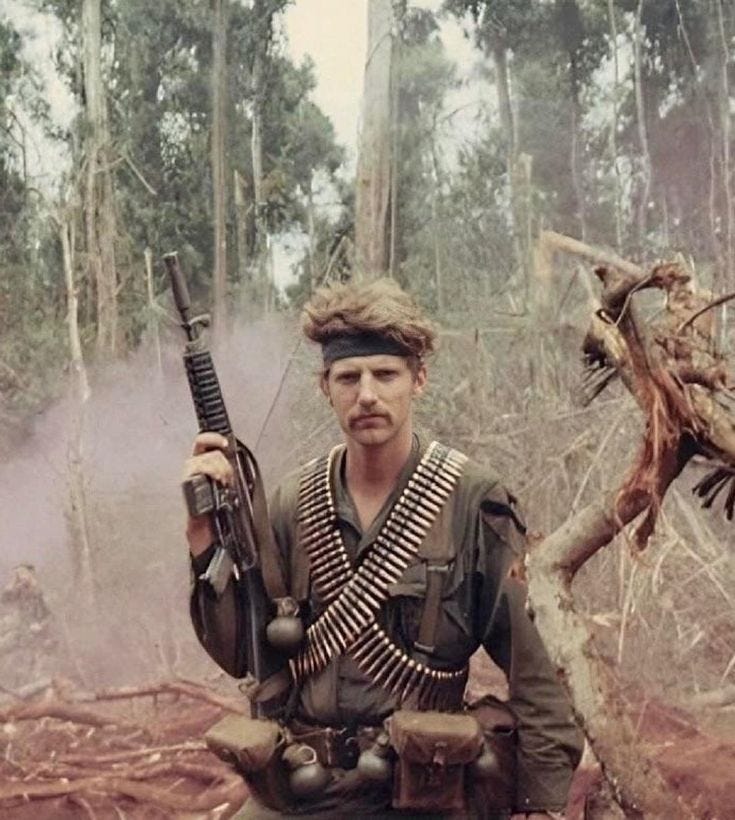
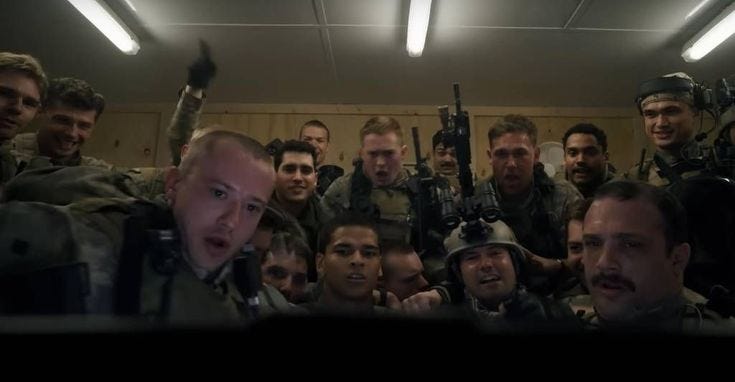
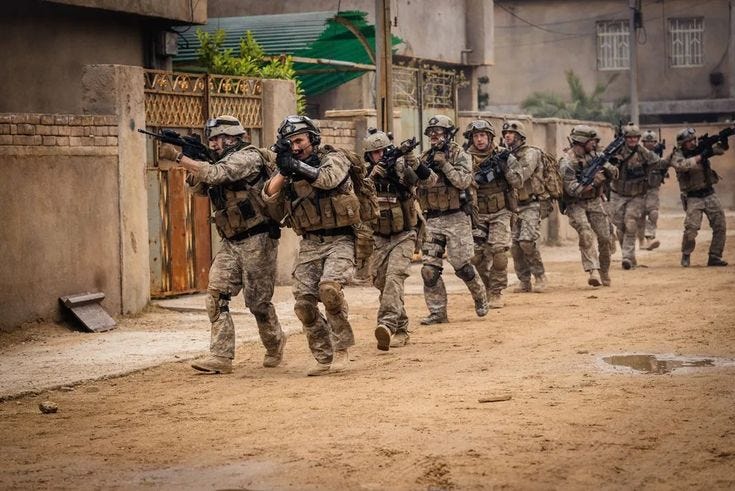
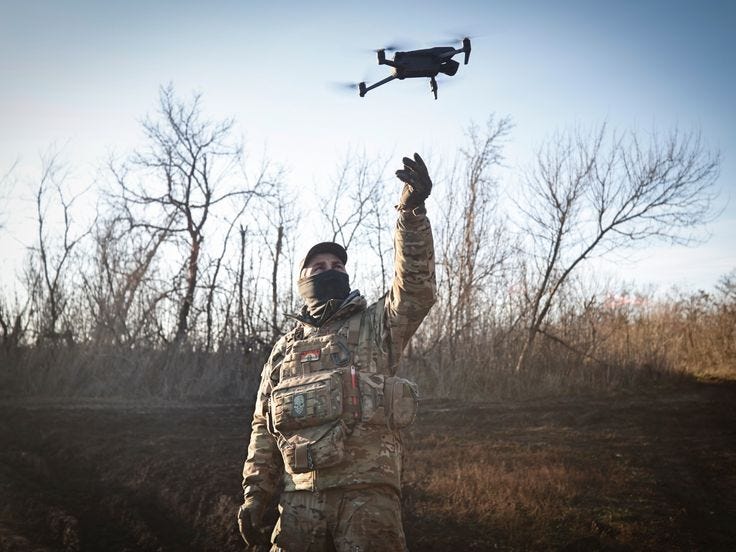
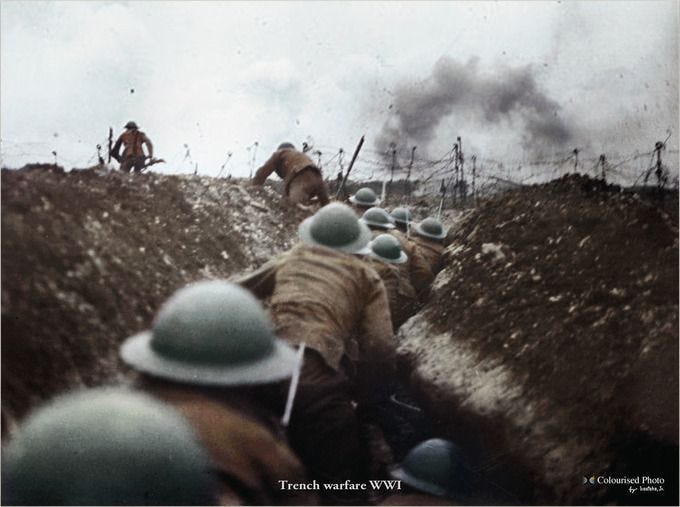
Excellent review, I will watch this over the weekend. Sadly I watched the Mission Impossible film which was a waste of $25 and IMAX screen time.
War (like all deep human experiences) is a paradox: it's messy and brutal and numbing and chaotic... and it's life-defining. It completely breaks people and leaves piles of dead... and it creates an opportunity for the closest bonds and the greatest feats of valor.
The tragedy of America's past century of war-making is the futility and banality of the fights, and the hypocrisy of our leaders. Our managerial class has wrapped war-making (and -funding) up into the same technocratic impulses as every other state function and so infantrymen get sent to fight and die for vague goals and secret bargains. Iraq and Afghanistan were as much about government contracts and supporting regional criminals and vacuous exercises in 'building capacity' as they were about fighting. This dishonesty, and the perverse incentives of the system, promote cynicism and hatred of that managerial class. Many recent political developments can be understood as a reflection of this.